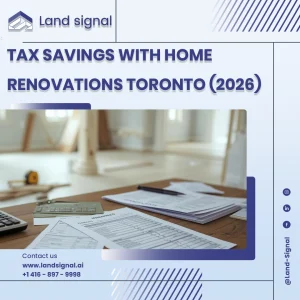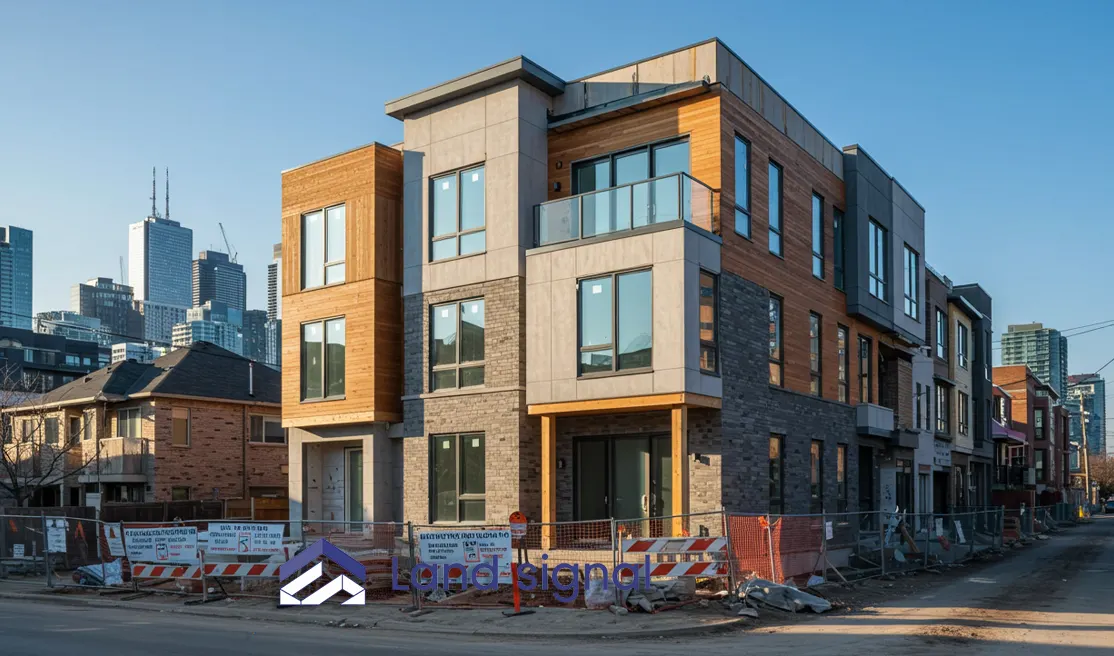In Toronto’s competitive real estate market, maximizing property value is a data-driven imperative. The decision to undertake a Renovation Before Selling House should not be viewed as an expense, but as a calculated financial strategy designed to amplify return on investment (ROI). Success hinges on moving beyond personal taste to embrace market-driven upgrades that resonate with the broadest possible pool of prospective buyers. This requires a precise understanding of which projects yield the highest returns, the nuances of buyer psychology, and the critical path of municipal regulations that govern substantive changes.
Start Your Project with Confidence
At Land Signal, we assist with construction and renovation permits, as well as Garden House and Laneway Suite designs. Let our experts guide you through every step.
Framing Renovations for Profit
Adopting an investor’s mindset is the foundational step in this process. Homeowners often renovate based on their own comfort and aesthetic, but pre-sale renovations have a singular goal: to increase the final sale price beyond the cost of the project.
This involves a detached, analytical approach where every decision is weighed against its potential ROI and its ability to appeal to a wide demographic. It requires analyzing local market comparables to understand what features are standard, expected, or considered a premium in your specific neighbourhood. Below, we’ll explore how this strategic mindset differs from a homeowner’s personal perspective.
| Investor Mindset (Pre-Sale) | Owner Mindset (Personal Use) |
| Focus on neutral, widely appealing finishes. | Prioritizes unique, personalized styles. |
| Calculates ROI for every project. | Focuses on comfort and personal enjoyment. |
| Upgrades to meet or slightly exceed area standards. | May over-improve for the neighbourhood. |
| Aims for speed and efficiency in project completion. | Timeline is flexible and based on convenience. |
Upgrading the Home’s Core
The kitchen and bathrooms are the functional and emotional heart of a home, and they are where buyers place the most scrutiny. Strategic upgrades in these core areas consistently deliver the highest ROI, often returning between 75% and 100% of the investment.
The key is to focus on minor-to-mid-range updates rather than expensive, gut renovations, which tend to have a lower percentage return. Executing a strategic Renovation Before Selling House means focusing on high-impact, cost-effective changes that modernize the space. We will now examine specific actions for each area.
Kitchen Upgrades
- Cabinet Refacing or Repainting: Instead of a full replacement, painting cabinets in a neutral white, light grey, or greige can dramatically brighten and modernize the space for a fraction of the cost.
- Hardware Replacement: Swapping old, dated handles and knobs for sleek, modern hardware in matte black or brushed nickel is an inexpensive yet highly impactful update.
- Countertop Refresh: Upgrading from laminate to a cost-effective quartz or granite option provides a significant perceived value boost.
- Appliance Modernization: If the budget allows, replacing one or two outdated appliances with stainless steel models can create a more cohesive and high-end look.
Bathroom Upgrades
- Vanity Update: A new, modern vanity or even just a new countertop and sink can transform the room.
- Fixture and Faucet Replacement: Update old brass or chrome fixtures with contemporary designs in brushed nickel or matte black.
- Reglazing and Re-grouting: Instead of replacing an entire bathtub or shower stall, consider professional reglazing to make it look brand new. Fresh grout lines eliminate any signs of age or mildew.
Aesthetic Uplifts for Buyer Appeal
While core upgrades anchor your home’s value, broader aesthetic improvements create the cohesive, move-in-ready feel that drives buyer offers. These are often low-cost, high-impact projects that enhance the overall perception of the property, making it feel clean, spacious, and well-maintained.
They neutralize the space, helping potential buyers to mentally move in without being distracted by your personal style choices. An effective plan for a Renovation Before Selling House must incorporate these critical finishing touches.
Painting
This is arguably the single most cost-effective renovation. A fresh coat of paint in a neutral colour palette (think soft greys, beiges, or off-whites) creates a blank canvas. It makes rooms appear larger, brighter, and cleaner, and it erases years of wear and tear.
Flooring
Worn-out carpets and damaged floors are major deterrents. Consider replacing them with budget-friendly yet durable options like engineered hardwood or luxury vinyl planking. These materials offer the high-end look of hardwood without the associated cost, appealing to modern buyers.
Lighting and Fixtures
Outdated light fixtures can date a home instantly. Replace builder-grade flush mounts and chandeliers with modern, stylish alternatives. Installing dimmer switches is another small touch that adds a layer of sophistication. Don’t forget to replace old switch plates and outlet covers for a clean, finished look.
Mastering the First Impression
Curb appeal is not a cliché; it is your one chance to make a powerful first impression. This initial visual impact can set a positive or negative tone before a buyer even steps through the door.
Research shows that projects enhancing a home’s exterior, such as a new front door, can yield an ROI of over 75%. This is a crucial element of any pre-sale strategy because it directly influences a buyer’s perceived value of the property from the moment they arrive. Investing in a meticulous Renovation Before Selling House includes giving the exterior the attention it deserves. Below is a checklist of critical actions:
- Front Door Enhancement: A fresh coat of paint on the front door in a bold, welcoming colour or a full replacement with a new steel door provides a significant ROI.
- Landscaping and Greenery: Neatly trim shrubs, mow the lawn, remove all weeds, and plant new, colourful flowers in garden beds or pots.
- Exterior Cleaning: Power wash the siding, driveway, and walkways to remove dirt and grime. Ensure windows are sparkling clean inside and out.
- Lighting and Hardware: Update exterior light fixtures, the house number, and the mailbox for a modern, cohesive look.
- Minor Repairs: Fix any cracked paving stones, peeling paint, or broken fence slats.
Avoiding Unrecoverable Investments
Just as important as knowing what to renovate is knowing what to avoid. Certain projects are poor pre-sale investments because they are either too costly to recoup, too niche to appeal to a broad audience, or fall into the category of “invisible” upgrades that buyers expect as standard.
- Swimming Pools: These are expensive to install and maintain, and they can be a deal-breaker for families with small children or buyers who see it as a liability rather than a luxury.
- Ultra-Luxe Upgrades: Installing a professional-grade kitchen or a spa bathroom that far exceeds the standard of the neighbourhood is a classic example of over-improving. You are unlikely to see a full return on such a high-end investment.
- Highly Personal Customizations: Converting a bedroom into a wine cellar, a home theatre, or a specialized gym narrows your pool of potential buyers. Most people prefer a blank canvas they can adapt to their own needs.
- Major HVAC or Roof Replacements: While essential for a home’s integrity, these are considered basic maintenance by buyers. You must disclose their condition, but you cannot expect to recover the full cost as added value; it’s simply the cost of bringing the home to a sellable standard.
Navigating Municipal Permit Requirements
Many of the most valuable renovation projects—such as converting a basement into a legal secondary unit, building a home addition, or making structural changes to your floor plan—require building permits from the municipality.
Attempting this work without proper approvals can lead to stop-work orders, fines, and significant legal complications during the property sale. The process of interpreting zoning bylaws and managing a permit application in the GTA is complex and time-consuming.
An intelligent Renovation Before Selling House is one that is fully compliant. This is where professional guidance becomes invaluable. At Land Signal, we specialize in managing the entire permit application process for Toronto homeowners.
From legal basement conversions to home extensions and second-floor additions, we navigate the complexities of municipal regulations on your behalf, ensuring your project is compliant and ready to maximize your home’s value.
Read Also: Renovation Permit Toronto | Everything You Need to Know Before You Build
Zoning Insights and Cost Projections
Before a single wall comes down, a truly strategic renovation begins with data. Understanding your property’s zoning potential is critical. Could you legally add a laneway or garden suite? Are you permitted to build a multi-unit residential project?
Answering these questions unlocks hidden value that a simple cosmetic update cannot. Furthermore, proceeding without accurate cost projections can derail your budget and erase your potential profits. Planning is paramount. Below are some of the key pre-construction services you should consider.
Land Signal provides the critical foresight needed for a successful project. We offer expert services that empower homeowners, investors, and contractors to make informed decisions:
- Zoning By-law Interpretation: We clarify complex regulations to determine what is feasible for your property.
- Design Consultations: We help you design compliant and valuable additions like laneway and garden suites.
- Construction Cost Calculator: Our tools provide realistic renovation cost calculator Toronto to help you budget effectively and assess your potential ROI.
By leveraging our end-to-end support, you can align your renovation goals with both municipal rules and financial realities. Explore how our services can inform your next project.
Conclusion
Ultimately, a successful renovation before selling is an exercise in strategic precision. It requires shifting from a homeowner’s perspective to an investor’s, focusing capital on high-impact projects like core home updates and aesthetic uplifts, and sidestepping costly personal customizations. Most importantly, it involves navigating the complex but crucial world of zoning and permits to ensure every dollar invested is both legal and profitable. A well-planned Renovation Before Selling House is a powerful tool for maximizing your property’s final sale price.













